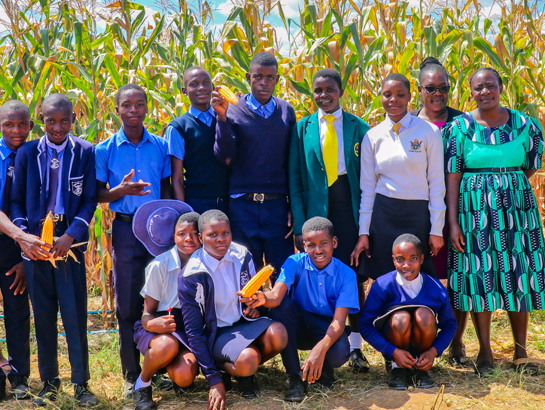Chifamba High School in Guruve, Zimbabwe, is cultivating more than just crops—it is growing a healthier, more nutrition-aware generation. With the support of HarvestPlus through the Expanding Nutrients in Food Systems project, funded by the Government of Canada, this boarding school has taken bold steps to integrate biofortified crops into its nutrition gardens. The school meals are now nutritious, and students learn about agriculture and health.
Under the guidance of HarvestPlus and with agronomic support from local extension officers, the school was sensitized on the importance of biofortification — a cost-effective, sustainable solution to fighting hidden hunger. HarvestPlus provided the school with high-quality seeds of the Iron bean variety NUA45 and vitamin A maize, laying the foundation for a healthier future.
“We started small last December with what seemed like a demo plot — half an acre of NUA45 beans and an acre of vitamin A maize,” shared Mrs. Kissnet Mupunga, an Agriculture teacher at the school. “We planted just 2 kilograms of NUA45 beans and harvested an impressive 150 kilograms. It was enough to include in our boarding school meals, and the learners loved it!”More than 90 students benefited directly from the nutrient-dense NUA45 beans served at mealtime. For many, it was their first encounter with biofortified foods — and made a lasting impression.
“I didn’t know beans could be different in terms of nutrients,” said Maisie Chitauro, a Form 5 student who participated in tending the gardens. “Now I understand that what we grow and eat matters. These NUA45 beans are good for our health.”
Her schoolmate, Tavonga Mhosva, echoed her enthusiasm: “Working in the garden taught me a lot about vitamin A maize and its benefits. I used to think vitamin A maize was just ordinary maize, but now I know it helps with our eyesight and prevent illnesses. I am proud that we are growing food that makes us stronger and smarter.”
The impact goes beyond nutrition. By incorporating biofortified crops into the school’s nutrition gardens, Chifamba Secondary is building a generation that understands nutrition-sensitive agriculture. Students are learning firsthand about the importance of combating micronutrient deficiencies — especially iron, zinc, and Vitamin A — through sustainable farming practices.
“This initiative has turned our school into a living classroom,” said Mr. Kissnet. “Students are not only getting nutritious meals but also gaining knowledge that they can take back home and share with their families and communities.”
Encouraged by their first successful harvest, the school is now preparing to scale up. They plan to expand their nutrition garden and grow a more diverse biofortified crops throughout the year. The goal is simple: to ensure a consistent supply of these nutritious foods in school meals and deepen students’ understanding of how agricultural innovations can be a powerful tool in the fight against hidden hunger.
